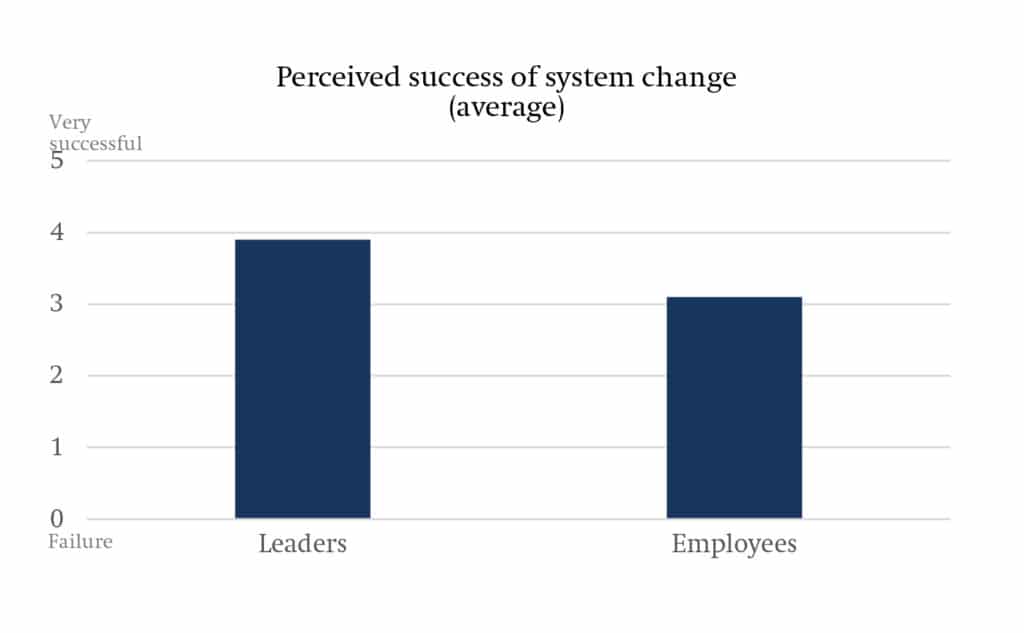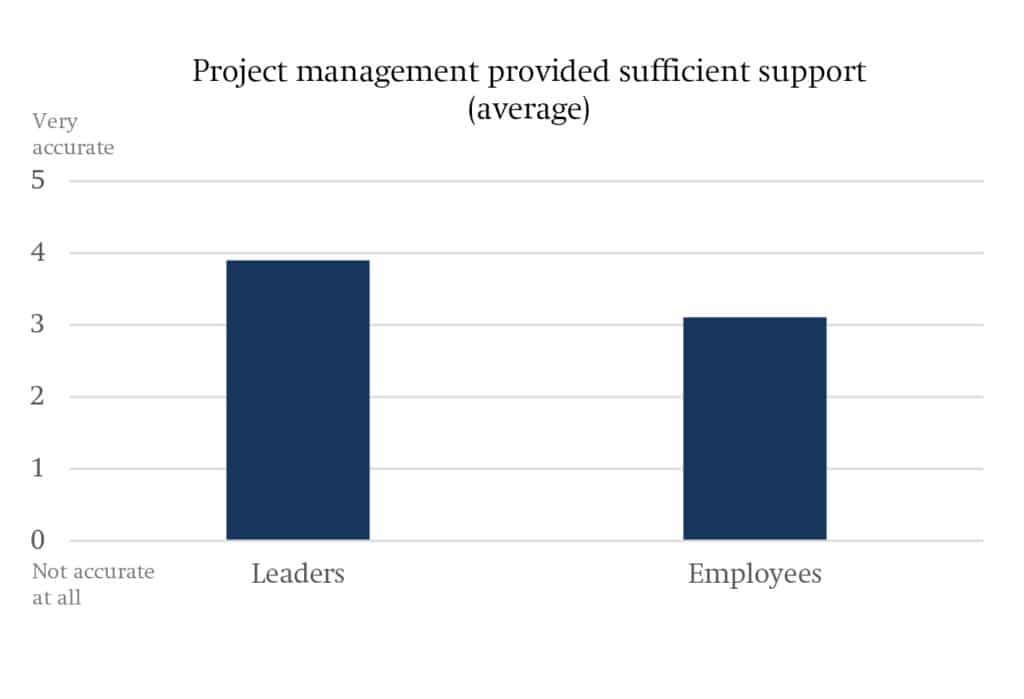
WHY NEGLECTING COMMUNICATION WILL BE YOUR DOWNFALL
According to Percy (2019), 70 percent of all change programs fail. Consequently, we know that achieving the intended results of a change program on schedule is more rare than common. There are several challenges related to change management that need to be addressed, communication and leadership being two of the most critical issues.
At Insource, we have comprehensive experience of working with organizational changes. Many of our consultants work with financial system changes and implementations, either as change managers or as line workers together with our customer’s employees. Thus, we have a strong interest in understanding how system changes are perceived and how the change processes can be adjusted to improve the experience and ultimately the result. With the intention to get a feel of the current pulse of the market and to challenge our knowledge and previous experiences, we have conducted a survey asking leaders and employees about their experiences of system changes. The questionnaire-based survey included a combination of 12 questions and statements, where 64 percent of the respondents are leaders and 36 percent are employees that have been involved in system changes.

As expected, the conducted survey shows that several different aspects can affect the outcome of a system change. However, before we go into critical issues related to system changes, we want to highlight the difference between the respondent groups. The leaders that participated in the survey generally viewed the results of the system change as more successful than the employees, and the leaders’ more positive views showed throughout the survey. The result of every question in the survey demonstrate that leaders have better experiences during system changes. Maybe it is because they are more informed, or in a position in which they can affect decisions and consequently the outcome? Regardless, the results fortify our existing knowledge that we all experience change differently and how important it is to manage changes strategically and considerately.

A study conducted by Harvard Business Review shows that poor communication and insufficient leadership and support are the most critical issues during organizational changes (Ibid.), findings that both our survey and experience support. One important finding from our survey is that when the system change was perceived as less successful, the respondents often felt that they did not get sufficient support from the project management to conduct their assigned activities. We can also clearly identify that the leaders perceived the support provided during the system change as more sufficient compared to the employees that participated in the study. Thus, we cannot stress enough how important it is that leaders have comprehensive knowledge of change management in terms of the tools needed to manage organizational change, and the ability to see different perspectives and adapt the communication to the business.

In line with the findings by Harvard Business Review, one of our survey statements ‘Management had a communication plan to convey the status of the process’ consistently received a low rating. We can see in the results that the management often do well when it comes to describing and motivating the purpose of the system change. However, the survey shows that communication is given less importance as the projects move on. Often there are no clear and established communication plans in place, meaning that involved and affected employees experience that they get deprived of information and understanding of the ongoing change. With no communication plan, it is also rare to have predetermined key metrics for communication. Metrics are a must have since they can be immensely valuable when it comes to following up the success of communication activities. It is not uncommon to hear ‘I haven’t heard anything about that’ regardless of countless of emails and other information on that specific issue – a clear indication that the communication must be adjusted. Further, the results tell us that the leaders perceived their own and the team’s engagement during the system change as high. This can be compared to the employees that on average answered that they themselves were quite engaged but that they perceived the team to be less so. The discrepancy in experience between the respondent groups highlights why thoughtful communication that engages employees is invaluable.
Considering our survey results and research telling us that internal organizational communication and internal supervisor communication links to positive organizational outcomes such as employee engagement (Karanges, Johnston, Beatson & Lings, 2015), one can ask why organizations tend to down-prioritize communication. Especially in change processes when employee engagement can determine the outcome of a project. Maybe leaders think that the benefits are less than the costs? Or maybe it is one of those things that can be forgotten in the efforts to get a project up and running quickly? In our opinion, neglecting communication during change is a major mistake. A communication specialist constitutes a fraction compared to the cost of a complete system change, and therefore we always recommend our customers to allocate a communication resource. To leave a margin for a change manager and communication specialist in a system change amounting to tens of millions SEK is a well-worth investment. You do not want to be the one explaining why you did not make sure that communication activities were conducted when the change program fails.
With our understanding of the importance of communication concerning employee engagement, we would like to argue that the results of many system changes that our survey respondents experienced could have been more successful if the projects would have focused on communication from the start. Including a sound communication plan and a resource that would have been responsible for the coordination and execution of all communication. Acknowledging that system changes are challenging, our experience is that numerous of opportunities opens up when a rigorous communication plan is implemented, and even more so when combined with the knowledge of an experienced change manager.
Communication and change management should always have a given place in the budget. In order to follow up and take adjusting actions, it is essential to set up key metrics for communication. If the communication index falls, the management will have a clear basis and direction for adjusting the communication into adequate and relevant information for the recipients.
Sources
Karanges, E., Johnston, K., Beatson, A. & Lings, I. (2015). The influence of internal communication on employee engagement. Public relations review, 41, 129-131.
Percy, S. (2019). Why do Change Programs Fail? Forbes Magazine. Viewed 2020-11-30 https://www.forbes.com/sites/sallypercy/2019/03/13/why-do-change-programs-fail/?sh=23df16a62e48











